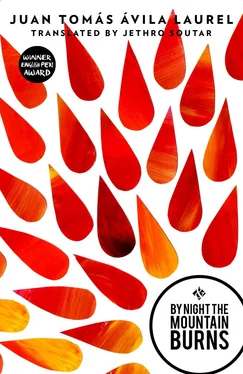Juan Ávila Laurel - By Night the Mountain Burns
Здесь есть возможность читать онлайн «Juan Ávila Laurel - By Night the Mountain Burns» весь текст электронной книги совершенно бесплатно (целиком полную версию без сокращений). В некоторых случаях можно слушать аудио, скачать через торрент в формате fb2 и присутствует краткое содержание. Год выпуска: 2014, Издательство: And Other Stories Publishing, Жанр: Современная проза, на английском языке. Описание произведения, (предисловие) а так же отзывы посетителей доступны на портале библиотеки ЛибКат.
- Название:By Night the Mountain Burns
- Автор:
- Издательство:And Other Stories Publishing
- Жанр:
- Год:2014
- ISBN:нет данных
- Рейтинг книги:5 / 5. Голосов: 1
-
Избранное:Добавить в избранное
- Отзывы:
-
Ваша оценка:
- 100
- 1
- 2
- 3
- 4
- 5
By Night the Mountain Burns: краткое содержание, описание и аннотация
Предлагаем к чтению аннотацию, описание, краткое содержание или предисловие (зависит от того, что написал сам автор книги «By Night the Mountain Burns»). Если вы не нашли необходимую информацию о книге — напишите в комментариях, мы постараемся отыскать её.
By Night the Mountain Burns — читать онлайн бесплатно полную книгу (весь текст) целиком
Ниже представлен текст книги, разбитый по страницам. Система сохранения места последней прочитанной страницы, позволяет с удобством читать онлайн бесплатно книгу «By Night the Mountain Burns», без необходимости каждый раз заново искать на чём Вы остановились. Поставьте закладку, и сможете в любой момент перейти на страницу, на которой закончили чтение.
Интервал:
Закладка:
We put our loads on our heads and walked back to the south village, the village we’d originally gone to in search of food. With the disappearance of my friend, the son of my surrogate grandmother’s friend, the circumstances had changed and our stay would be cut short. We’d go back to the big village where a decision would be made about what to do, whether to send out a search party to look for the boy, and if so, what sort of search party, whether the ministrants would be involved. And this was because on our Atlantic Ocean island, searches often failed when they were not led by the ministrants but by ordinary people. Or it might be decided simply to go back to the place where he’d been seen for the last time and place a † under the tree, on the understanding that his body had fallen to the ground and his innocent soul had ripped out of his body on impact. And that cross would have remained there forever, as a reminder to everyone that it was a dangerous place, so dangerous that somebody had lost their life there.
My friend and I had gone looking for that bird that fished in the sea and lived in the mountains, a bird with a long tail made of a single feather. I’ve already talked about the colour of the bird and spoken of the difficulty it had taking off from the ground. I’ve also said something about our motivations for going up to that misty and cloudy place, although we didn’t know it would be misty and cloudy when we set out. Our motivations: we had a great hunger for fish and, in the houses where we slept, there were no adult males who knew how to fish, and we didn’t know how, so we felt compelled to go to the mountains to catch a bird that wouldn’t take flight when man approached it. The bird did tend to peck if anyone tried to touch it, but its peck wasn’t so vicious that you couldn’t grab hold of its neck. But we principally went to the mountain because of our lack of fish, that shouldn’t be forgotten. If we’d had the means to throw a bit of nylon and an improvised hook into the sea, we would not have felt compelled to go to the mountain and put our lives at risk. Our duties in the south village should have been to accompany our respective mothers to their plantations so that they were not lonely, come back with them around midday, dump our loads in front of the house, follow the path to the nearest shore and return three hours later with a bundle of fish. I knew the shores of that part of the island well and I knew they were full of hungry fish. Indeed, I didn’t know of a shore on the island that wasn’t full of hungry fish. And I think that fact hurt us all the more, made our longing for fish that bit stronger. We could see fish right in front of our eyes and at the same time we had nothing to fill our mouths with. Or rather we had something to fill our mouths with, but it wasn’t what we wanted to fill them with. What grew in most abundance in the south village was cassava, which could be made into a round, white bread. And that bread was much nicer to eat if accompanied by a piece of fish and the sauce the fish had been cooked in. So that the sauce could soften the cassava bread and … I think I’ve talked about it already. When there was no fish, there was nothing. At a certain hour of the evening, your mother, or your grandmother’s friend, would shut the door, pulling it to from the inside with a stick, and you’d go to sleep on a noisy mattress of dried banana leaves. You’d go on hungering for fish, you’d have the cassava bread in your hand and you’d be in total darkness. Back then nobody in the south village had kerosene to light their lamps with. If there was any kerosene on the island at all, it would have been used to light lamps in the big village. So you’d be in total darkness in the south village, holding your hunk of cassava bread, waiting for sleep to take hold of you. Back then, all children slept right through. They slept right through whether they wet the bed or had grown out of the habit. Before going to bed you peed outside, two steps away from the door. In the south village, nothing gave off any light, and I think most people thought like me and preferred there not to be a moon, one of those bright full moons. Because they leave you exposed. I couldn’t go anywhere on my own on moonlight nights, for I knew evil things could see me from far away. And in that south village there was no noise of any kind at night, other than the cricri of the crickets and a noise the bats made with their throats. It was unusual for there to be any cocks in the south village as the season wasn’t right. So in that silence you heard the sea, the waves breaking against the rocks. The shores down there were rocky, in fact the whole southern coastline was rocky, and you heard the distant murmur of something pounding against the rocks. It was a frightening sound. In truth, everything was frightening at night. And before night had set in, you’d been hungry for fish, and you’d gone to bed in total darkness, so you’d been unsettled in the first place. And then you heard something pounding against the rocks in the distance, shaking the whole island.
We reached the south village, me, my surrogate grandmother and the mother of my friend, and told the few seasonal residents what had happened. The question of whether to begin an immediate search of the mountain was raised, whether to go to the big village right away or spend the night in the south village and go the next morning. Some people said there ought to be a search, that we ought to stop at nothing to find the boy, but that night was on the edge of the sky and the dying light, the crimson tide, would soon be upon us, so any search would be short-lived. Everyone would have to return to the village, for nothing could be done after nightfall, and it would be hard, very hard indeed on the poor mother to have to spend the night without her son. And this had become most evident because although everyone had come to help and offer support, the presence of the entire village in her house was what had saddened her most, for it felt like a wake, like her son had died, although nobody knew for sure. And it would have been a very hard night for her to get through with that heavy feeling in her heart. What’s more, she was not in the big village, where she could have drawn comfort, understanding and courage from her people, from more people. But some of the south villagers said it was too late to set off for the big village, that she’d only get there after nightfall anyway, so very few people would learn of what had happened. They said that no matter what was decided, it was better to wait until morning, when news of the boy’s disappearance could more easily be made known. But the woman was in a village where there was nothing to light the house with, and her son was lost in the bush. All the women of the village could come and keep her company, but nobody would say anything, for there was nothing to say. Everyone would sit outside the house until nightfall and then go inside to sleep on a big pile of dried banana leaves, people having brought them from their own homes, but still nobody in the big village would know what had happened.
Given all these considerations, it was decided the woman ought to go to the next village, a village not far from the south village, but on the other side of the mountain. The two villages are not so very far apart but they are divided by a mountain range that runs down the centre of the island, so anyone wishing to walk from one village to the next has to go up the mountain, the same mountain we’d climbed in search of the bird, cross one of its peaks and go back down the other side. With the sun half down, a group of us set off from the south village, a group that included me, my surrogate grandmother and the mother of my friend. We were going to that other village to ask its few seasonal residents if they knew anything about the boy lost in the bush, the boy who’d been hanging over the precipice. By the time we got there, it was dark and everyone had shut themselves in their homes. They didn’t have anything to light their houses with either, so they’d gone inside to keep safe. Or if they weren’t inside, they were sitting in their doorways, but it was impossible to see them in the darkness. And because the few inhabitants of that village were quite spread out, not all of them noticed our arrival. One of the women who’d accompanied us had a house in the village and we followed her, took the criss-crossed sticks from her doorway and went inside to sleep on a pile of old banana leaves. We shook them first, to check for snakes and rats that might have nested among them, then shut the door and went to sleep. I wasn’t aware of anything else that happened that night, though things did happen. Walking through the bush at night had left me exhausted. It was something I’d never done before. In fact, other than when something serious happened, nobody ever went into the bush at night. No activity took place in the bush while darkness reigned over the island.
Читать дальшеИнтервал:
Закладка:
Похожие книги на «By Night the Mountain Burns»
Представляем Вашему вниманию похожие книги на «By Night the Mountain Burns» списком для выбора. Мы отобрали схожую по названию и смыслу литературу в надежде предоставить читателям больше вариантов отыскать новые, интересные, ещё непрочитанные произведения.
Обсуждение, отзывы о книге «By Night the Mountain Burns» и просто собственные мнения читателей. Оставьте ваши комментарии, напишите, что Вы думаете о произведении, его смысле или главных героях. Укажите что конкретно понравилось, а что нет, и почему Вы так считаете.












